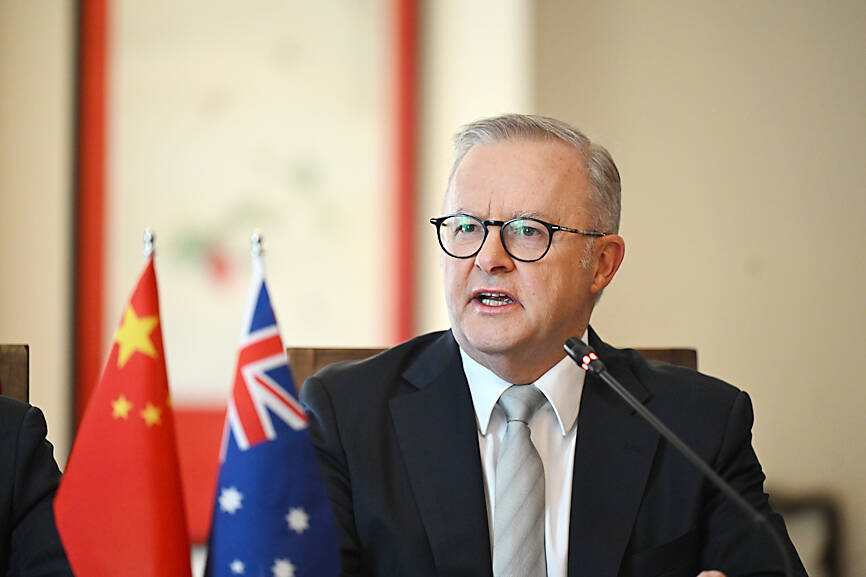Australia opposes any unilateral moves to change the Taiwan Strait “status quo,” Australian Prime Minister Anthony Albanese said during a trip to China to maintain steady ties with his country’s top trading partner.
“It’s important that we have a consistent position, which Australia has had for a long period of time,” Albanese said at a news conference in Shanghai on Sunday. “We don’t support any unilateral action there. We have a clear position, and we have been consistent about that.”
His comments come after the Financial Times reported over the weekend that the Pentagon is pressing Australia and Japan to clarify their roles if China invades Taiwan.

Photo: EPA
The US has urged countries such as Australia, Japan and South Korea to boost defense spending and support its efforts to counter what it views as China’s growing assertiveness in the Indo-Pacific region. All three nations, which have security agreements with the US, list China as their top trading partner and try to walk a careful line between Washington and Beijing.
Earlier this year, Chinese President Xi Jinping (習近平) expanded China’s Indo-Pacific presence by testing US allies on sensitive issues. This included sending warships off Australia’s coast for unprecedented shooting drills and flying a record number of balloons with possible military applications around Taiwan.
Japan has also faced pressure from heightened Chinese coast guard and military activity around uninhabited islands that Tokyo controls in the East China Sea.
Albanese’s reference to the “status quo” signals support for Taiwan’s de facto autonomy without endorsing formal independence, while maintaining recognition of the “one China” policy. His remarks highlight Australia’s opposition to any unilateral move — especially by force — to alter the cross-strait balance.
Before leaving, Albanese said he would not shy away from raising security and human rights concerns when he meets Xi during the visit.
Albanese is on a six-day trip to China to boost economic ties. On Sunday in Shanghai, he launched a tourism campaign featuring Australian icon “Ruby the Roo,” and fielded questions on defense spending and Taiwan.
Albanese said Australia is increasing its defense spending considerably, referring to a plan to invest A$57 billion (US$37.4 billion) over 10 years.
“Our aim of investing in our capability and investing in our relationships is about advancing peace and security in our region,” he said.
As Albanese went to China, his country and Papua New Guinea began hosting multinational military exercises known as Talisman Sabre, which would run for about three weeks.
The drills, which include amphibious landings, air operations and sea maneuvers, involve about 35,000 personnel from the US, Australia, Japan, South Korea and more than a dozen other security partners.
They are “meant to illustrate the closeness of the US-Australia alliance and the strength of the military-to-military relationship,” the US Army Pacific said in a statement.
Asked about the drills yesterday, Albanese said: “That is nothing unusual.”

“China is preparing to invade Taiwan,” Deputy Minister of Foreign Affairs Francois Wu (吳志中) said in an exclusive interview with British media channel Sky News for a special report titled, “Is Taiwan ready for a Chinese invasion?” the Ministry of Foreign Affairs said today in a statement. The 25-minute-long special report by Helen Ann-Smith released yesterday saw Sky News travel to Penghu, Taoyuan and Taipei to discuss the possibility of a Chinese invasion and how Taiwan is preparing for an attack. The film observed emergency response drills, interviewed baseball fans at the Taipei Dome on their views of US President

ECONOMIC BENEFITS: The imports from Belize would replace those from Honduras, whose shrimp exports have dropped 67 percent since cutting ties in 2023 Maintaining ties with Taiwan has economic benefits, Ministry of Foreign Affairs officials said yesterday, citing the approval of frozen whiteleg shrimp imports from Belize by the Food and Drug Administration (FDA) as an example. The FDA on Wednesday approved the tariff-free imports from Belize after the whiteleg shrimp passed the Systematic Inspection of Imported Food, which would continue to boost mutual trade, the ministry said. Taiwan’s annual consumption of whiteleg shrimps stands at 30,000 tonnes, far exceeding domestic production, the ministry said. Taiwan used to fill the gap by importing shrimps from Honduras, but purchases slumped after Tegucigalpa severed diplomatic ties with Taiwan

The Executive Yuan yesterday approved a southwestern extension of the Sanying MRT Line from New Taipei to Bade District (八德) in Taoyuan, with a goal of starting construction by late 2026. The 4.03-kilometer extension, featuring three new stations, will run from the current terminus at Yingtao Fude Station (LB12) in New Taipei City to Dannan Station (LB14), where it will connect with Taoyuan’s Green Line, New Taipei City Metro Corp said in a statement. This extension will follow the completion of core Sanying Line, a 14.29-kilometer medium-capacity system linking Tucheng (土城), Sansia (三峽)

CARGO LOSS: About 50 containers at the stern of the ‘Ever Lunar’ cargo ship went overboard, prompting the temporary closure of the port and disrupting operations Evergreen Marine Corp, Taiwan’s largest container shipper, yesterday said that all crew members aboard the Ever Lunar (長月) were safe after dozens of containers fell overboard off the coast of Peru the previous day. The incident occurred at 9:40am on Friday as the Ever Lunar was anchored and waiting to enter the Port of Callao when it suddenly experienced severe rolling, Evergreen said in a statement. The rolling, which caused the containers to fall, might have been caused by factors including a tsunami triggered by an earthquake in Russia, poor winter sea conditions in South America or a sudden influx of waves,